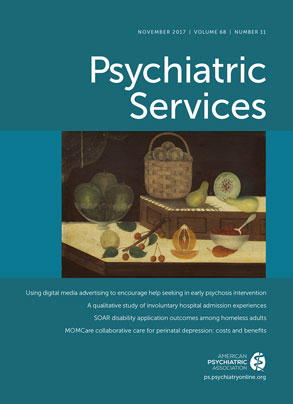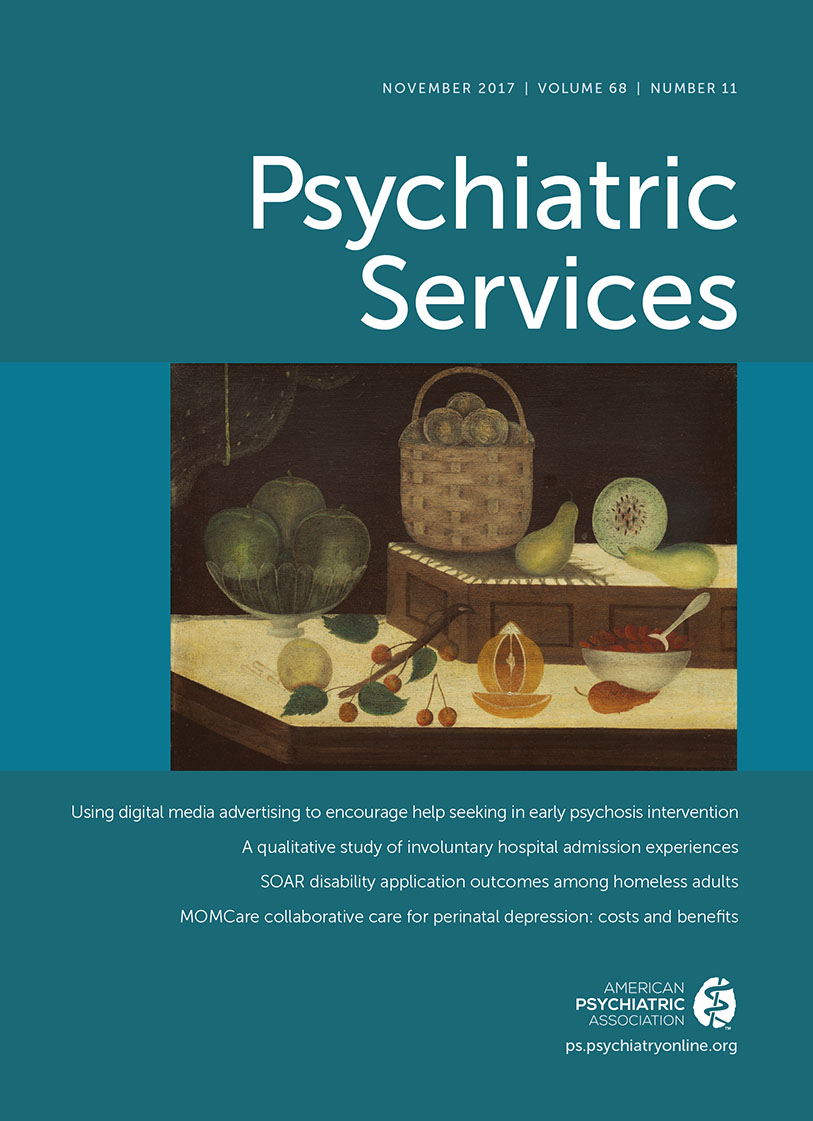Homeless adults experience high rates of negative health outcomes (
1) and have greater need for health care and prescription medication relative to the general population (
2). However, these needs are largely unmet, in part because of lack of health insurance (
2). Disability benefits, including Supplemental Security Income (SSI) and Social Security Disability Insurance (SSDI), provide income (
3) and health insurance for adults with disabilities and have been shown to increase access to health care (
4).
The Substance Abuse and Mental Health Services Administration (SAMHSA) developed the SSI/SSDI Outreach, Access, and Recovery (SOAR) program to increase access to disability benefits for homeless adults by training case managers about the process for determining disability (
5,
6). SOAR emphasizes five critical components for completing disability benefits applications: formal representation of the client by the case manager, submission of medical records, completion of a medical summary report to synthesize medical evidence, cosignature of a physician or psychiatrist on the medical summary report, and quality review of applications by a SOAR supervisor.
Over 50,000 SOAR-assisted applications have been processed, with a 65% approval rate (
7). A recent investigation found SOAR-assisted applications were twice as likely as non-SOAR-assisted applications to be approved (
6). However, that study did not examine the characteristics of SOAR applicants or applications that were associated with disability application outcomes. We addressed this gap by investigating predictors of between-applicant differences in application outcomes among homeless adults who completed disability applications with the assistance of the SOAR program.
Methods
Data on applications submitted between January 2006 and August 2015 were queried from a national reporting system maintained by the SOAR Technical Assistance Center. This study was found to be exempt from review by the North Carolina State University’s institutional review board.
The sample included 6,361 applicants from 39 states who were a mean±SD age of 43.02±12.39 (range 18–96), predominantly male (64%, N=4,059), and more likely to be literally homeless (58%, N=3,698) than to be at risk of homelessness (42%, N=2,663). A small proportion identified as veterans (8%, N=500 of 6,021) or were living in an institutional setting at the start of the application process (12%, N=716 of 6,125). Sample size discrepancies reflect a small proportion of missing data (2%) across study variables.
Applicant characteristics included living in an institution at the start of the application process (a jail, hospital, or residential treatment) (0=no, 1=yes), veteran status (0=no, 1=yes), public assistance receipt (0=no, 1=yes), homeless status (0=at risk, 1=literally homeless), gender (0=male, 1=female), and age (continuous; grand-mean centered). Literal homelessness was defined as sleeping outside, in a shelter, or in transitional housing. Risk of homelessness was self-reported by case managers consistent with SAMHSA Projects for Assistance in Transition from Homelessness definitions. Application characteristics (each coded 0 for no and 1 for yes) included medical records submitted, medical summary report completed, application cosigned by a physician or psychiatrist, quality review conducted by a SOAR supervisor, and consultative exam ordered. Dependent variables included application processing time (days from date of submission to decision) and application decision (0=denied, 1=approved).
Multilevel modeling (
8) was conducted with the PROC MIXED and PROC GLIMMIX commands in SAS 9.3. Applications (level 1) were nested within states (level 2). First, we conducted unconditional null models to establish significant variability at each level for both dependent variables (
8,
9). Second, bivariate models were conducted that tested for fixed effects (specifically, a consistent effect across all applicants). In models of application processing time, the slope between the predictor and dependent variable was allowed to vary to test for random effects (i.e., between-applicant variability in the effect). Third, two multivariate models were conducted with significant predictors from bivariate analyses for each dependent variable. Random effects included residual variability at each level of analysis as well as predictors showing significant variability around their slopes in bivariate models. Unstandardized regression coefficients (b statistics) and standard errors (SEs) are presented for all results. For our dichotomous outcome, we present odds ratios (ORs) and associated 95% confidence intervals (CIs).
Results
Overall, 70% of applications were approved (N=4,464 of 6,339), with an average 93.96±96.52 days of processing. A quarter of applicants (28%, N=1,675 of 5,928) received public assistance at the time of application. Most applications included medical records (94%, N=5,962 of 6,337) and medical summary reports (75%, N=4,733 of 6,315), 53% (N=3,323 of 6,313) had a cosigned medical summary report, 70% (N=4,440 of 6,313) had a quality review conducted, and 30% (N=1,685 of 5,668) had a consultative exam ordered.
In the unconditional null models, variability in processing time existed primarily between applications (level 1) (84%) versus between states (level 2) (16%). Further, there was greater variability in odds of application approval for applications (level 1) (b=.98, SE=.02, p<.001) compared with states (level 2) (b=.87, SE=.27, p<.001). Subsequent analyses investigated between-applicant differences (i.e., level 1 variability) in disability application outcomes.
In the bivariate analysis, female applicants had a longer processing time compared with male applicants (11.24 additional days; SE=4.56, p=.014). However, significant variability occurred around this slope (b=346.98, SE=158.88, p=.014). Processing time was 22.19 days shorter (SE=7.03, p=.002) for applicants who recently resided in institutional settings than for those residing in noninstitutional settings, and it was 16.16 days longer (SE=5.17, p=.002) for public assistance recipients relative to nonrecipients. Applicants with orders for a consultative exam experienced longer processing time relative to applicants who did not (28.64 days; SE=10.41, p=.006). However, there was significant variability in this slope (b=2,905.74, SE=961.67, p=.001). Other predictors were nonsignificant (p≥.267 for all).
Older age (OR=1.01, CI=1.005–1.01) and institutional status (OR=1.98, CI=1.59–2.47) were associated with greater odds of approval, as was submission of medical records (OR=1.85, CI=1.44–2.40), a medical summary report (OR=1.21, CI=1.05–1.39), and cosigned application (OR=1.37, CI=1.20–1.56) (p≤.008 for all). In contrast, female gender (OR=.73, CI=.65–.82), public assistance receipt (OR=.75, CI=.65–.86), and a consultative exam (OR=.43, CI=.38–.49) were associated with lower odds of application approval (p<.001 for all). All other predictors were nonsignificant (p≥.176 for all).
In model 1 of the multivariate models, we included significant bivariate predictors of processing time (
Table 1). We included a random effect of consultative exam; however, the random effect of gender was near zero and was removed. Public assistance receipt, consultative exam, and institutional housing remained significant predictors and explained 32% of between-applicant variability in application processing time. In model 2, we included the significant bivariate predictors of application decision (
Table 1). Gender, age, institutional status, public assistance receipt, medical records submission, and consultative exam remained associated with application decision and contributed to reduced between-applicant variability relative to the unconditional model.
Discussion
Lack of health insurance is a barrier to accessing services among homeless adults. Although programs have been developed to improve disability application outcomes in this population—notably, SOAR—few studies have examined factors associated with successful application outcomes. We examined applicant and application characteristics associated with disability application outcomes in a national sample of SOAR applicants.
Applicants who were older or living in an institutional setting generally had better disability application outcomes, although the effect size for age was small. These findings are consistent with research showing that older homeless adults are more likely than their younger counterparts to report access to income and a disabling or chronic condition (
10). Findings support the expanded use of SOAR for people involved with the criminal justice system (
7,
11), who may require assistance in re-establishing benefits upon release from correctional settings. In contrast, women and applicants receiving public assistance had poorer application outcomes, suggesting that these populations may be underserved by SSI/SSDI programs. Specifically, homeless women have similar, if not greater, needs for behavioral health services (
12) and income assistance (
13) compared with their male counterparts. Furthermore, recipients of public assistance (such as Temporary Assistance for Needy Families) may be unable to meet long-term work requirements for maintaining eligibility but may not meet criteria for a persistent disability to qualify for Social Security benefits.
Except for the quality review, we found effects of all SOAR critical components on application approval outcomes. Whether all five critical components are necessary to improve application success is a direction for future research. Our findings suggest submission of medical records may be the component most critical to the timely processing and success of a SOAR application. Although SOAR has been associated with successful disability application outcomes (
7), the fidelity with which the model is implemented remains to be seen.
Consultative exam orders were the most robust predictor of poorer disability application outcomes. Typically, a consultative exam order indicates that the medical evidence provided in the application was insufficient to evaluate the disability claim. In the context of the SOAR program, this request may reflect lack of adherence to critical components, unavailability of medical records, or limited community resources for medical assessments (personal communication, Lupfer K, April 2016). Lower approval rates may also reflect underreporting of behavioral health conditions by physicians conducting consultative exams, because the physicians may be unfamiliar with applicants’ medical histories (
14). Research is needed on the disability determination process after applicants submit a consultative exam.
Study findings are limited by the availability of applicant-level data across agencies providing SOAR services. In addition, data on the racial or ethnic backgrounds of applicants were not available. Furthermore, because of medical record privacy laws, the SOAR Technical Assistance Center does not report on applicants’ qualifying medical conditions for disability. Moreover, our findings do not speak to why certain characteristics were associated with better or worse disability application outcomes. Finally, we did not examine predictors accounting for variance in application outcomes between states due to the small sample size at level 2.
Conclusions
Findings highlight the need for research into why specific groups of SOAR applicants have poorer disability application outcomes, despite being in need of health insurance and income support. The SOAR model has the potential to improve disability application outcomes among homeless adults. However, prospective investigations are needed to establish the effectiveness of and fidelity to the SOAR model.

